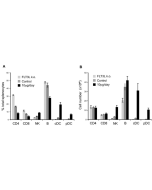Cookie Policy: This site uses cookies to improve your experience. You can find out more about our use of cookies in our Privacy Policy. By continuing to browse this site you agree to our use of cookies.
AdipoGen Life Sciences
Fc (human):RANKL, Soluble (mouse) (rec.)
As low as
265
CHF
CHF 265.00
In stock
Only %1 left
AG-40B-0059-C01010 µgCHF 265.00

| Product Details | |
|---|---|
| Synonyms | TRANCE; ODF; OPGL; TNFSF11; CD254 |
| Product Type | Protein |
| Properties | |
| Source/Host | HEK 293 cells |
| Sequence |
Mouse RANKL (aa 157-316) is fused at the N-terminus to the Fc portion of human IgG1. |
| Crossreactivity | Mouse |
| Specificity |
Binds to mouse RANK. |
| Biological Activity |
Induces osteoclastogenesis of bone marrow-derived macrophages. |
| MW | ~55kDa (SDS-PAGE) |
| Purity | ≥95% (SDS-PAGE) |
| Endotoxin Content | <0.01EU/μg purified protein (LAL test; Lonza). |
| Concentration | 0.1mg/ml after reconstitution. |
| Reconstitution | Reconstitute with 100μl sterile water. |
| Formulation | Lyophilized. Contains PBS. |
| Protein Negative Control | |
| Other Product Data |
UniProt link O35235: RANKL (mouse) |
| Shipping and Handling | |
| Shipping | BLUE ICE |
| Short Term Storage | +4°C |
| Long Term Storage | -20°C |
| Handling Advice |
After reconstitution, prepare aliquots and store at -20°C. Avoid freeze/thaw cycles. Centrifuge lyophilized vial before opening and reconstitution. PBS containing at least 0.1% BSA should be used for further dilutions. |
| Use/Stability |
Stable for at least 6 months after receipt when stored at -20°C. Working aliquots are stable for up to 3 months when stored at -20°C. |
| Documents | |
| MSDS |
 Download PDF Download PDF |
| Product Specification Sheet | |
| Datasheet |
 Download PDF Download PDF |
Description
RANKL is an osteoclast differentiation and activation factor. Augments the ability of dendritic cells to stimulate naive T cell proliferation. Important regulator of interactions between T cells and dendritic cells and may play a role in the regulation of the T cell-dependent immune response. RANKL plays an important role in the progression of Breast cancer.
Product References
- Two distinct mechanisms underlie progesterone-induced proliferation in the mammary gland: M. Beleut, et al.; PNAS 107, 2989 (2010)
- RANKL Signaling Sustains Primary Tumor Growth in Genetically Engineered Mouse Models of Lung Adenocarcinoma: J. Faget, et al.; J. Thor. Oncol. 13, 387 (2018)
- Tumor necrosis factor receptor family costimulation increases regulatory T-cell activation and function via NF-κB: M. Lubrano di Ricco, et al.; Eur. J. Immunol. 50, 972 (2020)






